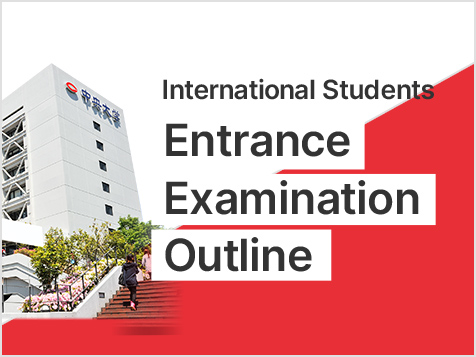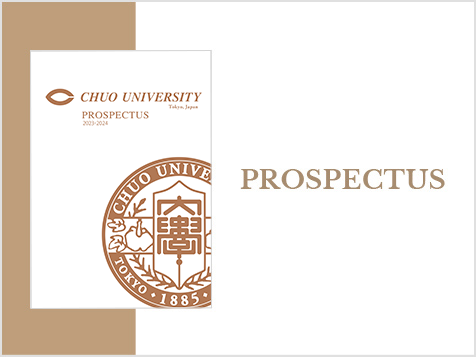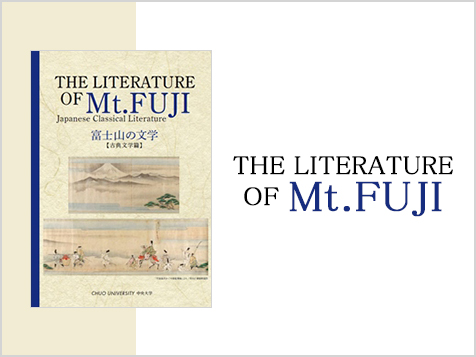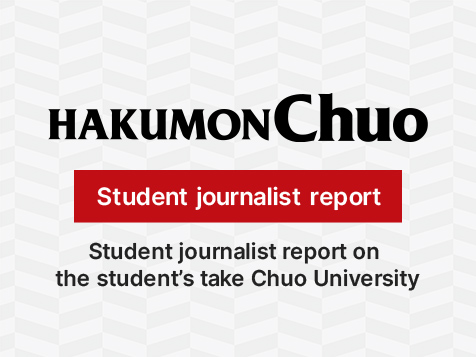Academics
Faculty of Science and Engineering
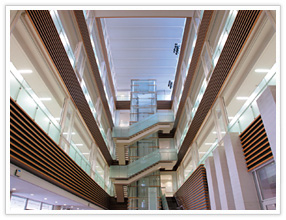
The campus of the Faculty of Science and Engineering sits on high ground in the middle of leafy surroundings in the Korakuen district of Bunkyo-ku, in the center of Tokyo. Equipped with the latest educational and research facilities, the Faculty, together with the Graduate School of Science and Engineering and the Institute of Science and Engineering, is proud of its comprehensive education and research capability.
From its inception, the Faculty has never ceased to put a high priority on fostering basic and universally applicable academic abilities, and also on nurturing talented scientists of independence and self-reliance, by equipping students with knowledge that will allow them to respond flexibly to whatever problems emerge in the rapidly developing science and technology. As a result, the number of presentations made at academic conferences by the graduate students reaches more than 350 per year, representing the world-class high-level intellectual productivity of the Faculty.
Departments:
Mathematics
Physics
Civil and Environmental Engineering
Precision Mechanics
Electrical, Electronic, and Communication Engineering
Applied Chemistry
Data Science for Business Innovation
Information and System Engineering
Biological Sciences
Integrated Science and Engineering for Sustainable Societies
Date of Founding: 1949
Campus: Korakuen Campus
Number of Students: Undergraduate Student Enrollment
Faculty Brochure is here(1.7MB)
Competency Development in the Faculty of Science and Engineering
The word competency refers to a portion of behavioral characteristics that utilizes knowledge for pursuing a certain objective. Recently, much attention has been focused on competencies as important demands for professionals as well as individuals. As a part of the educational reform activities, the Faculty has started an educational program for systematic competency development since 2008. Firstly, each department has created a more specific definition of the professional image that is expected for graduates of the department. Then, the definition was set for 7 key competencies (communication, problem-solving, knowledge acquisition, organized behavior, creativity, self-realization, and specific ability in students' major), which in turn were carefully refined into a total of 33 keywords. Finally each keyword was divided into 5 stages (in other words, as many as 165 items were created!) in order to develop an achievement level check list (also known as rubrics). Through the rubrics students are expected to check their competencies regularly by themselves as well as to be checked by professors/TAs. This approach enables direct and objective assessment of potential ability and behavioral attributes, and now it is considered as one of the leading educational system in Japan.
Academic Minor System in the Graduate School of Science and Engineering
In addition to a student's academic major, an academic minor system has been implemented in the Graduate School of Science and Engineering since 2003. This educational program features systematic study of advanced topics in interdisciplinary fields. Currently, the GSSE offers a total of 6 academic minors (Disaster/Danger Management Engineering, Environmental Engineering, Data Science, Nano-Technology, Electronic Society/Information Security, and Sensory Robotics). All of these minors are fields in which the GSSE possesses strong capability, and are expected to grow greatly in the near future. When conducting academic minors, teaching faculty from different academic majors cooperate to provide research guidance through lectures and the creation of research papers. Minors allow students to learn the research methods and acquire specialized knowledge in other academic fields. Therefore this academic major/minor system realizes reciprocal educational effect which prevents graduate students from being immersed solely in their affiliated majors.
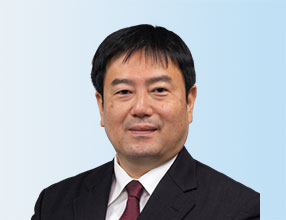
Welcome to the website of Faculty and Graduate School of Science and Engineering, Chuo University!
It is well known that education and research are the backbone of a university. In order to conduct high-level education and research, it is essential to have excellent human resources and an environment that supports them. The Faculty and the Graduate School of Science and Engineering have both. The Faculty offers a variety of learning opportunities in 10 departments: Mathematics; Physics; Civil and Environmental Engineering; Precision Mechanics; Electrical, Electronic, and Communication Engineering; Applied Chemistry; Data Science for Business Innovation; Information and System Engineering; Biological Sciences; and, Integrated Science and Engineering for Sustainable Societies. Based on the founding spirit of Chuo University, "Fostering the Ability to Apply Knowledge to Practice,” we provide education that enables students to acquire practical knowledge, problem-solving skills, creativity, and expertise that can be utilized in society.
In addition to the highly specialized courses offered in each department, the educational power of the Faculty of Science and Engineering as a whole is enhanced. One particular area we focus on is the enhancement of AI and data science education. Besides the “Chuo University Interfaculty AI and Data Science Program,” which started in 2021 across the entire University, we have also introduced courses unique to the Faculty of Science and Engineering, and are providing a full range of AI and Data Science education programs led by specialists centered in the Department of Data Science for Business Innovation.
Another focus is globalization. We are taking the opportunity to enhance our English curriculum further with the introduction of an entrance examination using external English tests from AY 2022. In addition to the study abroad programs offered for Chuo University as a whole, the Faculty of Science and Engineering offers an extensive range of unique programs, including short-term study abroad programs and global internships. Furthermore, we have introduced a new selection of courses related to entrepreneurship, and through the linkages with these courses, we aim to nurture individuals with entrepreneurial minds who can truly prosper globally.
In addition, the Graduate School of Science and Engineering offers nine majors: Mathematics; Physics; Civil, Human and Environmental Science and Engineering; Precision Engineering; Electrical, Electronic, and Communication Engineering; Applied Chemistry; Data Science for Business Innovation; Information and System Engineering; Biological Sciences; as well as a doctoral-program-only course in Electrical Engineering and Information Systems. Leading researchers and outstanding graduate students engage in cutting-edge research in a wide range of fields that include basic science, engineering, and the integration of arts and sciences. Please visit our website for news of faculty and graduate school student award recipients. As you will see, the Faculty and the Graduate School of Science and Engineering overlap and combine for seamless education and research opportunities. The location of the Korakuen Campus (Bunkyo ward), where both the Faculty and the Graduate School of Science and Engineering are based, offers a significant advantage for our research. Numerous seminars and workshops of academic societies are held nearby, and annual meetings of academic societies and international conferences are often held on the Korakuen Campus. These events are invaluable for our research in terms of gathering information and networking, ensuring that the Korakuen Campus functions as a research hub. Another appeal of the Korakuen Campus is its quiet and green surroundings, despite its location in central Tokyo.
In 2023, the Faculty of Law relocated to Chuo’s Myogadani Campus, which is very close to Korakuen, establishing a two-campus system of Chuo University. This relocation offers further integration of the humanities and sciences, specifically collaboration with the Faculty of Law and the Faculty of Global Informatics located on the Ichigaya Tamachi Campus, enabling students from our Faculty to take lectures at the two neighboring Faculties. We believe the proximity of these Faculties offers us an excellent opportunity for further growth.
Having introduced the current situation of the Faculty and the Graduate School of Science and Engineering, we must also mention our many outstanding graduates. There are more than 70,000 graduates from the Faculty and Graduate School of Science and Engineering alone, and about 600,000 graduates from Chuo University as a whole. Many of these graduates have made remarkable achievements in their respective fields, embodying Chuo University's motto of "Knowledge into Action.” Their presence and support greatly strengthen our research and education.
I hope this introduction has given you a glimpse of the appeal of the Faculty and the Graduate School of Science and Engineering. But better yet, come visit the Korakuen Campus and see for yourself.
Kazunori UMEDA Dean, Faculty of Science and Engineering
Close

